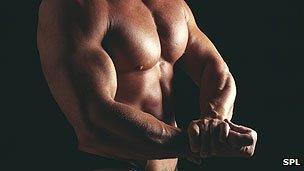Body image: Men 'most unhappy about beer bellies'
- Published

Most men in the survey said they wanted more muscles and less of a beer belly
Four out of five men confess to being unhappy about their body, suggests an online survey by the University of the West of England.
The Centre for Appearance Research at UWE studied the responses of 384 British men with an average age of 40.
The biggest body issue for them was their "beer belly" and lack of muscles.
Thirty-five percent of respondents said they would trade a year of their life to achieve their ideal body weight or shape.
The research suggests that it is not just women who talk among themselves about their body image.
The study compiled from the results of the survey found that 80% of men who responded engaged regularly in conversation about one another's bodies.
The greatest issue men have is with their muscularity, with 60% saying that their arms, chests and stomachs were not muscular enough.
This desire for more muscle mass may explain why one in five men questioned was on a high protein diet, and nearly one in three used protein supplements.
Dr Philippa Diedrichs, who led the study at the Centre for Appearance Research at UWE in Bristol, described this conversation between men about their bodies as "body talk".
She said: "Body talk reinforces the unrealistic beauty ideal which reinforces leanness and muscularity.
"This is traditionally seen as an issue for women but our research shows that men are feeling the pressure to conform too.
"We need to take a collaborative approach to promoting an environment that values diversity in appearance and promotes healthy body image."
Dr Diedrichs said this was not a case of encouraging obesity, but an attempt to not trivialise negative body image issues.
Rosi Prescott, chief executive of Central YMCA which commissioned the research, said: "Historically conversation about your body has been perceived as something women do, but it is clear from this research that men are also guilty of commenting on one another's bodies; and in many cases this is having a damaging effect.
"The high levels of body talk that we have found in men are symptomatic of a growing obsession with appearance."
Karine Berthou, founder of The Succeed Foundation, an eating disorders charity in the UK, said men must be included in body image programmes.
"Negative body image is a serious issue in our society and is a key risk factor in the development of eating disorders."
- Published14 August 2010